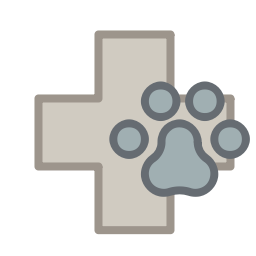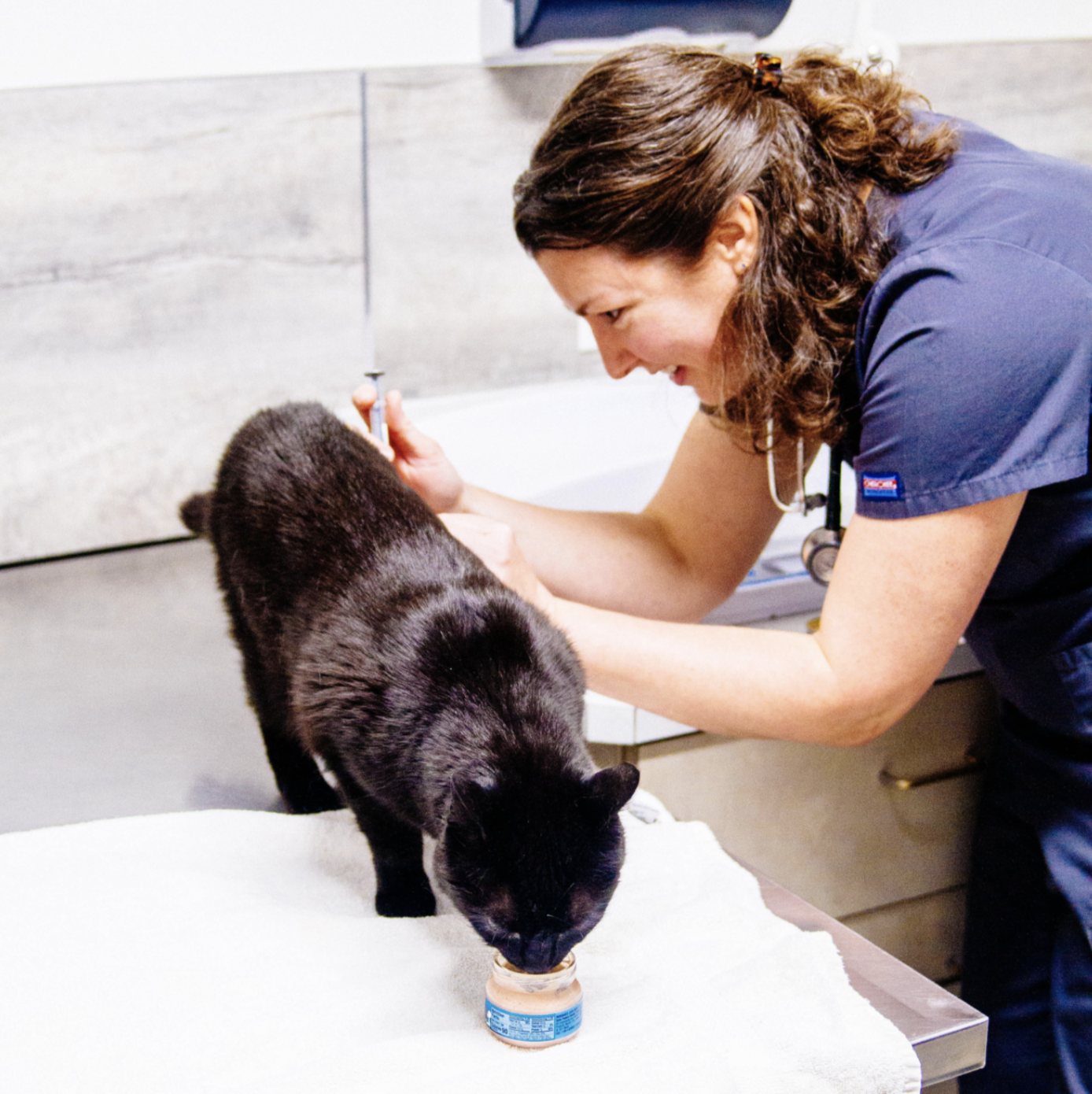Wellness & Preventive Care
We’re here for your pet during every stage of their life.

We offer preventive care to keep your pet on track
to living a long, healthy life.
Annual wellness exams are crucial for assessing your pet’s overall health, identifying potential issues before they escalate, and maintaining their well-being for a long, vibrant life. Our commitment extends across various life stages, offering specialized and preventive care in their youth and regular wellness checks as they age, ensuring early detection and prevention of potential health challenges.
Recognizing the significance of your pet in your life, we dedicate ourselves to delivering top-notch care throughout their entire lifespan. The American Animal Hospital Association advocates for annual wellness exams, with increased frequency as your pet advances in age. Our emphasis on preventive care is reflected in tailored wellness protocols designed for each life stage of your beloved companion. These protocols may encompass vaccinations and disease screenings, providing comprehensive and proactive healthcare to safeguard your pet’s health and happiness.
Why are wellness exams important?
Wellness exams give us a chance to evaluate the overall health of your pet while also giving us a baseline for their own unique bodies and tendencies. They also allow us to detect potential problems before they become serious and even make your pet more familiar with our veterinary hospital, making future visits easier on them and you.
When should my pet visit the vet?
We believe in preventive medicine as the best approach to keeping our patients healthy. This includes annual wellness examinations, vaccinations on a one- or three-year basis, external and internal parasite prevention, and dietary management. Our doctors will help determine what vaccinations are appropriate according to you and your pet’s needs. We will discuss in detail what your options are to help you make the best possible health decisions for your pet.
How do wellness exams work?
During a wellness exam, our veterinary team will start out by taking your pet’s vital signs. Our veterinarian will perform a comprehensive examination of your pet from nose to tail and may also perform diagnostic tests such as blood work, urinalysis, or intestinal parasite tests. Depending on your pet’s life stage, vaccines may be administered, as well as disease screenings for heartworm, kidney, liver, blood disorders, and more.
Wellness examinations do not necessarily mean that your pet is going to be subjected to complicated or costly medical tests and treatments. This allows us to prevent major health issues from developing undetected and gives us the opportunity to analyze and record baseline values such as temperature, body condition, and lab work. We measure these when your pet is healthy in order to provide better care in the event of illness or emergency. A dental health exam and a weight check are always important parts of a wellness exam and may indicate problems that can progress rapidly and have a significant impact on your pet’s overall health.
Early detection and correction of medical problems will help to ensure that your pet will live a long, healthy, and active life.

Parasite Control
Parasites such as fleas and ticks can be very damaging to your pet’s health. Preventive measures should be taken year-round to inhibit potential outbreaks.
The idea of your pet being infested with parasites is a disturbing thought, but it’s also a medical issue that can have serious consequences. Parasites can diminish the quality of life and even cause life-threatening health issues.
Common internal parasites include heartworms, roundworms, hookworms, whipworms, and tapeworms. The most frequent external parasites include fleas and ticks. Your pet should be free from parasites, both internal and external.
Why are parasites dangerous?
Fleas
Fleas are small, wingless, brown, fast-moving insects you can see in your pet’s fur. Some animals are allergic to the saliva of fleas, which can cause inflammation and more discomfort. If ingested while your pet is grooming themselves, fleas can transmit an intestinal parasite called tapeworm. Flea infestations can lead to anemia, and fleas are also capable of transmitting serious diseases.
Ticks
Ticks are members of the spider family and live in cracks and crevices in the home or outside in vegetation such as grassy meadows, woods, brush, and weeds. Some tick bites only cause mild irritation or swelling at the site, but other tick bites can infect your pet with serious illnesses. If left untreated, these diseases, such as Lyme, can lead to more severe health problems or even be fatal.
Note: If you see a tick and cannot remove it, we will gladly help you. Call us immediately to limit the impact of the tick’s attachment. It’s much safer to have one of our trained professionals remove the tick for you. Make an appointment with us immediately to limit the impact of the tick. An annual blood test is required to screen for tick-borne diseases.
Heartworm Disease
Heartworms are transmitted when an infected mosquito bites your pet. Heartworms are parasites that live in the heart and its surrounding blood vessels. The adult heartworm produces offspring called microfilariae, which circulate in the pet’s blood. Unrecognized and untreated heartworm infections can be fatal.
When should I seek treatment for parasites?
Fleas
If your pet is showing signs of fleas such as continuous scratching, gnawing, or licking, schedule an appointment immediately. Additionally, flea dirt, the byproduct of fleas that looks like coffee grounds or pepper, can usually be seen by looking at your pet’s abdomen or by combing your pet’s coat with a fine-tooth comb.
Ticks
If you see a tick on your pet, do not try and burn it off with a match. This does not work and could harm your pet. It’s much safer to have one of our trained professionals remove the tick for you. Make an appointment with us immediately to limit the impact of the tick.
Heartworm Disease
The best treatment for heartworms is prevention. One of the most common and effective prevention methods is a monthly oral medication.
The parasite is transmitted through mosquito bites, and usually, the pet shows no signs for months. Later symptoms include difficulty breathing, coughing, weight loss, tiring easily, and listlessness. In many cases, pets do not show outward signs until advanced stages of the disease. An annual blood test is recommended to screen for heartworms. This disease can be treated if found early, but it can be costly.
How can I prevent parasites?
Our veterinary team is happy to help you choose the correct preventive regimen based on your pet’s risk factors and health status. It is important to discuss with us yearly which pest control products are ideal for your household based on the everyday life of your pet.
Microchipping
Microchip identification is the most reliable way to reunite lost pets with their owners.
Microchip identification helps return an estimated 8,000 lost cats, dogs, and other animals to their homes every day. Pet ID chips are the most reliable way to reunite pets with their owners and provide peace of mind.
Why should I microchip my pet?
Microchip identification is the most reliable way to find lost pets and return them home with their owners. The procedure is safe, easy, and inexpensive.
When should I microchip my pet?
Some owners feel that their pet doesn’t need identification because they stay indoors, but in our experience, these are the most likely to become lost when they accidentally get outside. As separation from your cat or dog can happen all too easily, permanent identification by microchipping is critical. Every pet should have microchip identification as the procedure can be done at any age.
How does microchipping work?
The small microchip (the size of a grain of rice) is injected under the skin between the shoulder blades of your pet in a relatively harmless veterinary procedure. The chip is permanent, lasting the whole life of the pet. Your information has to be registered with your bar code number so that you can be contacted if your pet ever becomes lost.
If a pet is found, all animal care facilities (shelters, hospitals, etc.) will scan the pet for a microchip using a special microchip reader that is simply waved over the skin. Once a microchip is found, a special hotline is called, and the lost pet is reported. The pet owner is then called immediately and given the contact information about where to pick up their pet.
Puppy and Kitten Wellness Visits
1st Visit: Initial Comprehensive examination by one of our caring veterinarians.
- DAPP vaccination
- Bordetella vaccination – Canine
- Feline Leukemia – Cat
- Fecal Test
- Nail Trim
- Roundworm medication
2nd and 3rd Visit: Follow up examination by the veterinarian.
- DAPP vaccination-every 3-4 weeks until the puppy is 16 weeks.
- FVRCP – Cat
- Round Worm Medication
- FVRCP
Follow Up Visit: Rabies Vaccine at 3-6 month of age
- Round Worm Medication
Vaccinations
Preventive care is an important aspect of maintaining your pet’s health. Proper vaccination is vital in protecting them against harmful diseases.
There are a variety of diseases that affect animals, so proper vaccination of your pet is vital in protecting them from the many types of illnesses to which they are susceptible.
Why are vaccinations important?
Vaccinations are vital to the health and protection of your pet and serve as a preventive measure in combating viral diseases like parvovirus, parainfluenza virus, distemper, Lyme, panleukopenia, feline leukemia virus, and rabies.
When should my pet get vaccinated?
Vaccinations are particularly important for puppies, kittens, and other young animals that have immature immune systems. Veterinary vaccinations generally begin at 6-8 weeks of age and then boostered throughout your pet’s life, depending on the vaccine. Our doctors will determine the appropriate vaccination plan for your pet.
How are vaccines administered?
Vaccines help to combat diseases by exposing the pet’s immune system to inactive or small amounts of a particular form of bacteria or virus. Vaccines are administered through subcutaneous injection (under the skin), orally, or intra-nasally, depending on the vaccine.
Vaccinations are accompanied by a consultation and examination with our veterinarians to make certain that your pet’s condition is stable enough to receive them. Proper and timely administration is necessary to ensure optimal protection.
